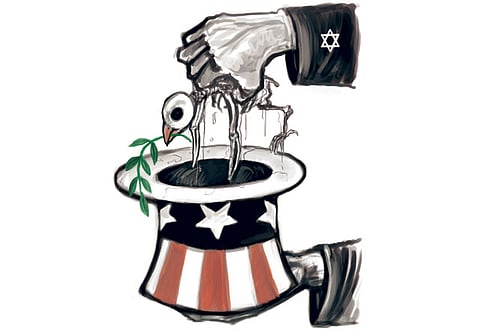US must spell out two-state vision
When will Washington finally grow tired of Tel Aviv's intransigence and pull it up for endangering peace and its interests?

The strategic and supposedly unshakeable alliance between the US and Israel seems to be in trouble as a result of Israel's unbudging stance over US demands to freeze colony expansion in occupied Jerusalem. This is especially embarrassing because the US had succeeded in convincing the Palestinian National Authority to engage Israel in indirect "proximity talks", but has now been made to look weak and wavering in the eyes of its Arab allies.
Not even the unprecedented action behind the scenes and the public criticism of Israel seems to sway Israeli Prime Minister Benjamin Netanyahu. US Secretary of State Hillary Clinton was blunt in her speech before the powerful American Israel Public Affairs Committee (AIPAC), saying: "New construction in [occupied] Jerusalem ... undermines that mutual trust and endangers the proximity talks ... It exposes daylight between Israel and the US ... [and] undermines America's unique ability to play a role in the peace process."
Israel is reaping the bitter harvest of its policies and uncompromising intransigence. It seems to have alienated its two staunchest allies, the US and the UK.
As The New York Times put it, "Even as Netanyahu met with [US President Barack] Obama at a session during which the White House pointedly withheld the usual trappings of a visit by the head of a government, Israel's other ally, Britain, expelled an Israeli diplomat. It was a rare move by a friendly government, meant as a rebuke for what appeared to be the use of a dozen fake British passports by assassins suspected of being Israeli agents in the killing of a Hamas official in Dubai."
"Such misuse of British passports is intolerable," British Foreign Secretary David Miliband said in the House of Commons. "The fact that this was done by a country which is a friend only adds insult to injury."
Waning confidence
The public humiliation of US Vice President Joe Biden should not be taken by the US administration as politics as usual since its credibility is at stake. Furthermore, Arab and Muslim confidence in Obama, buoyed by his speech in Cairo and reconciliatory gestures, is waning.
What is telling is the angst exhibited by Washington's most influential lobby the Pentagon's top brass, not AIPAC. They have been outspoken in warning that Israel's intransigence and the stalled Middle East Peace process are endangering US national interests and eroding its credibility among Arab allies. On January 16, a team of senior military officers from US Central Command (responsible for overseeing American security interests in the Middle East) briefed Chairman of the Joint Chiefs of Staff Admiral Mike Mullen on the Israeli-Palestinian conflict. The briefing highlighted the concerns of Commander of the US Central Command David Petraeus over the stalled Middle East peace process. The assessment was an eye-opener, because in the view of many Arab leaders, the US was believed to be "incapable of standing up to Israel". Petraeus went as far as requesting that the West Bank and Gaza be made a part of his area of operations.
According to the leading Israeli daily Yedioth Ahronoth, Biden "engaged in a private and angry exchange with the Israeli prime minister" after the briefing, saying: "This is starting to get dangerous for us, what you are doing here undermines the security of our troops who are fighting in Iraq, Afghanistan and Pakistan. That endangers us and endangers regional peace … "
US military concerns were repeated in a blunter manner by Petraeus in his briefing before the influential Senate Armed Services Committee in mid March. Petraeus argued on record that "the enduring hostilities between Israel and some of its neighbours present distinct challenges to our ability to advance our interest in the AOR [area of responsibility]. Israeli-Palestinian tensions often flare into violence and large-scale armed confrontations. The conflict foments anti-American sentiments, due to the perception of US favouritism for Israel. Arab anger over the Palestinian question limits the strength and depth of US partnerships with governments and peoples in the AOR and weakens the legitimacy of moderate regimes in the Arab world. Al Qaida and other militant groups exploit that anger to mobilise support. The conflict also gives Iran influence in the Arab world through its clients, Lebanese Hezbollah and Hamas."
America has diagnosed the disease but it has thus far failed to take the medicine to cure itself and remedy the situation. It thus continues to lose credibility and fails to defend its national interests and win the hearts and minds of Arabs and Muslims. The US should, as former national security adviser Zbigniew Brzezinski said, spell out its own vision of what a two-state solution would look like. More than a year since Obama's election, not much has changed. The US should call a spade a spade and point the finger at the obstructionists who do not want peace and endanger its national interests and troops. When will the US do the right thing and end this charade?
Professor Abdullah Al Shayji is the chairman of the Political Science Department at Kuwait University.


